
Tim Kotcheff was one of the original members of the canoe group and the only one to have travelled down all 27 rivers mentioned on this website – most of them with his canoe partner Craig Oliver.
Learn More About Tim
The club’s original members were Tim Kotcheff and Craig Oliver, novice canoeists when in 1973 they paddled the French and Magnetawan rivers in northern Ontario. The following year, they ventured north and west, aiming at the Nahanni the most beautiful of rivers. If this was unwise – two people in a single canoe can easily come to grief on a river in the wilderness – it also produced a lasting bond. Over three decades, they nearly always shared a canoe, Oliver, a celebrated television correspondent, in the stern and Kotcheff, by turns, Vice-President of CTV and CBC television news and current affairs, in the bow. As the years rolled by, Oliver’s eyesight became an issue, as did Kotcheff’s hearing, but it was a successful partnership nevertheless. They liked to claim they had never dumped, although this was always based on a forgiving definition of the term – a definition that will not stand scrutiny of the Snare River portfolio. And, like partners in a marriage of longstanding, they quarreled – constantly and volubly – earning them the sobriquet “the Odd Couple.” In camp, Kotcheff was chef de cuisine, a role he sometimes shared with David Silcox and John Macfarlane. They planned ambitious menus, weeks in advance, the ingredients painstakingly packed in waterproof containers. An even greater contribution to the group’s well-being on these sometimes arduous adventures was his dark sense of humour. Even in moments of great tension, and perhaps especially in such moments, he could make us laugh till we cried.
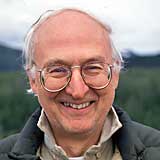
Craig Oliver: John Macfarlane sometimes addressed Craig Oliver as “My liege” because, while it was a matter of debate, he claimed to be the Rideau and Arctic Canoe Club’s leader.
Learn More About Craig
The most the others would grant him was “putative” leader, although there’s no doubt that his influence over the selection of rivers and, still more, the recruitment of new canoeists was beyond question. It’s safe to say that no one joined the club without his blessing, and once a member you were sometimes referred to as “one of my men.” While his concern for the safety and well being of the people with whom he paddled was genuine, if they showed him any deference it was more likely because he assumed the naval practice of providing a ration of rum—in this case, a rum daiquiri— before the evening meal. There was always grumbling that he skimping on the alcohol or favouring some in his pours, but no matter how miserable the day’ events these were the happiest of Happy Hours. And often, thanks to Oliver, the most entertaining. During most of these years he was CTV’s bureau chief in Ottawa or Washington, and no one, it seemed, had more stories to tell—or took more pleasure in telling them. Some were politically and historically significant. Some were no more than gossip. Some, we assumed, were true, but who cared?
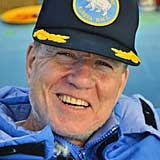
Peter Stollery canoed 20 rivers over a period of some 30 years. He joined the first group venture – the Snare River – in 1977. He was lauded for his ability to catch, clean and and cook fish for the canoe team, among his many talents.
Learn More About Peter
As a teenager Peter Stollery, whose family owned a men’s haberdashery in downtown Toronto, dropped out of school and spent the better part of two decades as a part-time merchant mariner and world traveller. To say that he’s been everywhere is only a slight exaggeration. In the 1960s he wrote about his foreign adventures for Maclean’s. But this was only the beginning of an unlikely career in which he was briefly a taxi driver before entering politics as the Member of Parliament for the Toronto riding of Spadina in 1972. Nine years and three successful re-elections later he was appointed to the Senate, where he remained for 29 years. He was unquestionably the most colourful of the Arctic and Rideau Canal canoeists, a fiercely independent autodidact who read widely and remembered everything he read,…..and said. Challenging him on a historical or geographic fact was usually folly. He was also unapologetically eccentric. He wore hip waders in the canoe, and added a cheap folding lawn chair to his pack. We all laughed – what kind of wilderness canoeist carries a folding lawn chair? – but in the years to come we all did.
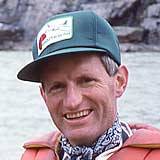
John Godfrey joined the team in 1978 for our first run on the Petawawa River – a warm up for bigger things to come. He brought culinary skills to our camp cuisine and was best known for his artistic preparation of our meal starters.
Learn More About John
John Godfrey was a history professor at Dalhousie University and a year away from his appointment as President of King’s College when he joined us on the Petawawa in 1978. By the time he did the river for a third time in 2006, he had moved from the academy to journalism, editing the Financial Post from 1987 to 1991, and from journalism to politics, serving as a Liberal Member of Parliament from 1993 to 2008. When he retired he was Paul Martin’s Minister of State for Infrastructure and Communities. He was a philosopher by training, with a doctorate from St. Antony’s College, Oxford, but, as we would learn on the river, he was also philosophic by inclination. In moments of crisis – and, no matter what the river, there were always moments of crisis – he would invariably retreat into a book, which he always had handy for just this purpose, while the others, to a man classic A types, haggled among themselves about the appropriate course of action. This the haggling—was sometimes unpleasant and might take hours. Meanwhile, Godfrey, off to the side, enjoyed his book, serene in the knowledge that the right decision would be made without his participation. Always above the fray, it was Godfrey who once observed that the reason we paddled these rivers was that we were never tested in war.

Ted Johnson completed 14 rivers starting with the Hood River in 1980. He brought considerable navigational skills to the team and is an accomplished pilot and radio operator.
Learn More About Ted
As a boy, Ted Johnson dreamed of becoming a bush pilot. He got his pilot’s licence a year before he was eligible for a drivers licence. But he allowed himself to be side – tracked, becoming a lawyer instead, a member of the Liberal Party, and from 1980 to 1984 the Executive Assistant to then-Prime Minister Pierre Trudeau. (He had previously served as a Special Assistant to Finance Minister Jean Chrétien and Justice Minister Ron Basford.) Working with Trudeau, he visited many of the world’s capitals. Following government service he became Senior Vice-President, General Counsel and Secretary of Power Corporation in Montreal. He acquired a love of the Canadian North , and, although never formalized, his role on these trips was chief navigator, radio operator, and – all too often – master boat builder. These skills came to the fore in moments of extremis. He was also the group’s resident Canadian historian, with a special interest in the lore of the ill-fated Franklin expeditions. This scholarly inclination enriched our trips. Ted served as Chairman of the National Theatre School of Canada, a Fellow and past Vice-President of the Royal Canadian Geographical Society, a Fellow of the Royal Geographical Society, a Director of the Atlantic Salmon Federation, and of the Nature Conservancy (Québec region), and Vice-Chairman of the Board of the Pierre Elliott Trudeau Foundation.

David Silcox joined the team for 9 rivers beginning with the Petawawa in 1978 and ending with the Back in 1998. He brought impressive culinary skills to our campsite cuisine.
Learn More About David
David Silcox knows about the finer things of life cultured. An art historian and cultural administrator – in his years paddling Arctic rivers with us he was Assistant Deputy Minister of the Federal Department of Communication (Culture), Ontario Deputy Minister of Culture and Communications, Associate Dean of Fine Arts at York and Director of the U of T Arts Centre – he began his career at the Canada Council and would end it as President of Sotheby’s Canada. Along the way, he wrote seminal books about David Milne, Tom Thomson and Christopher Pratt, among others. He was catholic in his discernment. Well educated, well read, and well informed, he also knew more than most of us about living well – which is to say how to eat, drink and travel well. His invention, the freezer box, allowed us to eschew freeze-dried food, standard fare in the Arctic, in favour of steak, lamb chops, beef stroganoff, and, on one memorable occasion, cherries jubilee. The freezer box was a disposable refrigerator: a large, waxed, cardboard box, insulated with Styrofoam, powered by dry ice, and ceremonially burned at the end of each trip. And it was also Silcox, along with Kotcheff and Macfarlane, who encouraged us to accompany our evening meals with fine wine, which added weight to the canoes, but no one complained. (For the record, we carried the empty bottles back to civilization.) It’s fair to say that the Arctic may have seen more adventurous expeditions than ours, but thanks to Silcox it’s unlikely ever to have seen happier, better-fed expeditioners.

John Macfarlane completed 9 rivers with the canoe team, His first was the Burnside in 1983. Apart from his contribution to our camp cuisine, he was also appointed official sommelier.
Learn More About John
John was a natural for our band of adventurers. During his flowing and impressive career, he made an impact on The Globe and Mail, Toronto Star, Maclean’s magazine, Toronto Life, Weekend Magazine, Saturday Night magazine, Financial Times of Canada, CTV, and The Walrus – in creative, editorial, or publishing and communications business in Canada as a heavyweight volunteer on the boards of Writer’s Trust, International Festival of Authors, Canadian Journalism Foundation, National Magazine Awards Foundation, YMCA of Metropolitan Toronto, Royal Conservatory of Music, and a founder of Friends of Canadian Broadcasting. What is most pertinent is he is knowledgeable about fine wines and became our official sommelier, a demanding task that Kotcheff and Silcox as chefs, were happy to delegate as long as they were consulted at tasting time. Macfarlane’s wide acquaintances made him a generous contributor to the gossip sessions, which is what, in truth, our daily happy hours were, or at emergency happy hours, which were held if it were raining and Craig (or anyone else) could be persuaded to declare an emergency. Silcox notes that he had the pleasure of Macfarlane as bowman on his first jaunt down the Burnside River. John was enough later to tell folks that David saved his life on the Isortoq River on Baffin Island. Silcox returns the favour by pointing out that if it weren’t for Macfarlane’s skill and tenacity, neither would likely be contributing to this book.
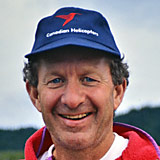
John Gow was on 7 trips beginning with the Hanbury and Thelon rivers in 1979. He is acknowledged to be the most skilled canoeist and outdoorsman of our group.
Learn More About John
John Gow, from an old Banff family, grew up there, the son of a Mountie. He was an outdoorsman from an early age. In the spring of 1968, a year after being certified as a mountain guide, he was in a small plane that crashed near Golden B.C. The pilot was killed. Gow was thrown out of the plane and only regained consciousness the following day, concussed, cut-up, but otherwise unhurt. He decide to make his way to Golden, 25 km across the Purcell Mountains. The snow was deep, his progress agonizing and slow, the weather sub-zero. When he finally reached a road after four days, he had serious frostbite. At the hospital, the doctors amputated both feet. A less determined man would have given up climbing, skiing and wilderness canoeing, but a decade later Gow was on the Hanbury and Thelon rivers with, among others, another accomplished canoeist, the recently retired Prime Minister Pierre Trudeau. A few years later he joined the group again on the Burnside River which cascades into Bathurst Inlet at the end of a grueling 7 km portage that required three round trips each. This was an ordeal even for those of us with two feet, but everything we carried he carried – without complaint. Only when one of us noticed him sitting outside his tent tending his bloody stumps, did we appreciate the cost of his endurance. When he took up skiing again, only four months after his accident, he won five gold medals at the World Skiing Championships for the Disabled, and at the Paralympics.

Eddie Goldenberg was a regular with the canoe team and joined us for 7 rivers beginning with the Bonnet Plume in 1984 and ending with the Back River in 1998.
Learn More About Eddie
Eddie joined the group in 1984 for the Bonnet Plume trip and returned for several more. A lawyer, he joined Jean Chrétien in the 1970’s and remained with him as a trusted advisor for over thirty years. When Chrétien as Justice Minister, served as Pierre Trudeau’s lieutenant for the partition of Canada’s constitution and creation of the Charter of Rights and Freedoms, Eddie was at his side. And when Chrétien went on to lead the Liberal Party to three successive majority governments he chose Eddie as his Principal Secretary. His book, “The Way It Works”, provides a rich insight into the workings of the Trudeau and Chrétien administrations. Eddie’s summers at Camp Ahmek stimulated a passion for canoe camping and trained him as an astonishingly energetic and uncomplaining packhorse on portages. While he wasn’t our best paddler, he was fearless abut the risks and oblivious or indifferent, as it seemed to many of us, to his own safety or, occasionally, to that of others. He entertained our good-humoured jibes and banter, and was astute whenever politics was the topic of debate. Eddie had an abundant store of political gossip and hilarious anecdotes to tickle our appetite for the inside story. He tended to be judiciously brief on disparate subject, and was always in a good mood.
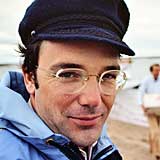
Jean Pelletier joined us for three river trips – the Snare, the Noatak and the Hanbury-Thelon where he served as bowman for Pierre Trudeau.
Learn More About Jean
In 1977, following the decision to expand the group to explore the Snare River in the Northwest Territories, Jean Pelletier was one of the first to be invited. On that adventure, he distinguished himself in two ways – serving as a faithful and competent bowman for Peter Stollery (Jean drew the short straw) and capturing a sizeable Lake Trout with his shirt. The fish was still mysteriously tied to Senator Stollery’s fishing line. The following year he re-joined the canoe group to paddle the Noatak River in Alaska. In 1979 he sat in the same canoe with former Prime Minister Pierre Trudeau on a trip down the Hanbury-Thelon. Jean was then Washington correspondent for La Presse and just months after his historic paddle with Pierre Trudeau, he broke the story that Canada had harboured six American diplomats during the Iran hostage crisis. The full account was later published in his book “The Canadian Caper.” The hostage story earned Jean the 1980 National Newspaper Award. It also earned him the undying affection of Craig Oliver, who received the tip from Jean to ensure CTV News was the first to break the hostage story for English Canada. His career has included stints as a reporter for Le Devoir, Ottawa and Washington correspondent for La Presse, national correspondent for Télévision de Radio-Canada, and a columnist for Le Journal de Montréal. He later went on to become chief editor of the Radio Canada news and current affairs programs Le téléjournal (1995–97) and Le point (1992–97), then served as news director until January 2003, when he took over the Features and Documentaries unit. Jean is currently Senior Director of Television News and Current Affairs for Radio-Canada.
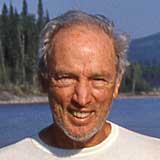
Pierre Trudeau was on three trips – the Hanbury-Thelon in 1979, the Stikine in 1994 and his last – the Petawawa in 1996. He was one of our best paddlers.
Learn More About Pierre
Pierre Trudeau came early to canoeing. He spent summers working on his English and his j-stroke at Camp Ahmek, an exclusive and highly regarded boys’ camp in Ontario run by the legendary paddler and outdoorsman, Taylor Statten. There, three young paddlers to a half-waterlogged cedar-strip canoe, lugging canvas tents over Algonquin Park’s innumerable portages, he developed his physical strength as well as his passion for the outdoors and the canoe. In his early twenties he joined friends in an epic four-month voyage by canoe from Montreal, up the Ottawa to the twenty-mile-plus ‘grande portage’ over the Height of Land and down the Abitibi and Moose rivers to James Bay.
Following his election to Parliament in Ottawa, Pierre fell in with Eric Morse and his Voyageurs, joining them in 1966 for a descent of the seldom-paddled Coppermine River to the Arctic Ocean. During that trip he and a companion paddled the death-defying ‘Rocky Defile’ (so named by Franklin on his 1823 expedition), a feat for which Morse, who chose instead the three kilometre, back-breaking portage, labelled them “the lazier members of our expedition!” Pierre’s skill with a paddle, his strength on the portage, his meticulous attention to detail, his insistance on sharing all burdens and his affable good nature around the campfire endeared him to those of us who enjoyed the privilege of travelling with him.

Bob Fowler joined the canoe group for two rivers – the Bonnet Plume in 1984, and the Wind River in 1989. He is also the esteemed editor of our canoe book, ‘Sing Louder, Paddle Harder – Canoeing Wild Arctic Rivers in the Company of Friends’.
Learn More About Bob
Bob Fowler was the foreign affairs advisor to prime ministers Trudeau, Turner and Mulroney, deputy minister of defense, Canada’s longest serving ambassador to the UN (where he played a pivotal role in ending the 27 year long civil war in Angola) and G8 Sherpa, PM’s Representative for Africa and our ambassador to Italy. In our never-ending campfire geopolitical debates, he had to be listened to because he knew things the rest of us didn’t. And, like Pierre Trudeau, he was generous with his knowledge—someone who was intent, not on proving he was smarter than everyone else, but on making everyone else smarter. And for someone who hadn’t spent a lifetime in a canoe, a pretty good bowman. He was also a man of extraordinary courage. Almost twenty years after the Wind, he was on assignment in Niger as Special Envoy of the UN Secretary General when he and Louis Guay were kidnapped by Al Qaeda. They were held hostage in the Sahara desert for 130 days, an ordeal that made the challenges of Arctic rivers seem puny. After he was released he wrote a book entitled “A Season in Hell,” which Kofi Annan noted “shows us the power of the human spirit in the face of adversity and danger. His courage and determination allowed him to persevere through moments of physical and emotional stress unimaginable to most.” It turns out he is also a better writer than any of us knew.

Bill Williams: Dr. Bill canoed two rivers – the Ajaqutalik in 1990 and the Back in 1998. He was always a welcome addition to the group along with his medical kit.
Learn More About Bill
Bill Williams is from the Eastern Townships. He learned his outdoor skills at his father’s knee, becoming an accomplished camper, canoeist, and fly-fisherman in the backwoods of north-central Québec. He graduated from McGill in medicine and specialized in cardiology. Shortly after completing his Residency, and a stint as a flying doctor in Zambia, he and his young family moved to Ottawa where he became a member of the University of Ottawa’s Heart Institute. Each year Bill spends a couple of weeks in Iqaluit, on Baffin Island, conducting a heart clinic. His rugged good looks (when spotted in a crowd, George Clooney is often murmured by the distaff side), evident skills, and open and outgoing personality made him a popular doctor and welcome canoeing partner. He was equally comfortable at either end of the canoe. He joined us relatively late in our game and our ageing members were careful to encourage our cardiologist pal to assume the last place in any long and strenuous portage. Like Ted, Bill is a pilot who offered navigational counsel. He is also a well-read intellectual whose contributions to our rambunctious postprandial ‘discussions’ were much appreciated. Bill’s presence invariably lightened the mood and his medical skills offered comfort and reassurance to our progressively decrepit membership. He would deal with minor cuts and was clearly capable of rising to greater challenges, even if the greatest demand was for early morning analgesics on the part of the keepers of the ‘so-called’ communal rum supply.
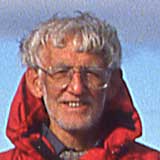
George Falconer was on 2 rivers with the team – the Rowley in 1995, he was a friend of Graham Rowley after whom the river was named, and the Back in 1998.
Learn More About George
George Falconer was born in the U.K. in 1929 and came to Canada in 1954. He received a scholarship to study geography at Cambridge and the Arctic Institute of North America offered him another to continue his studies at McGill. He became a specialist in the Surveys and Mapping branch of the Department of Energy, Mines and Resources. In 1980 George was responsible for the publication of the Canada Gazetteer Atlas, which was acclaimed as the most comprehensive geographic reference book Canada has ever produced. He also helped arctic explorer and archaeologist Graham Rowley, write “Cold Comfort,” about the Canadian eastern Arctic. Rowley recommended that George be recruited to join the team for a planned trip down Rowley’s eponymous river in 1995.
George turned out to be a marvelous canoeing companion, admired not only for his intellect but because he always pulled more than his weight on difficult portages. He was 66 when we tackled the Rowley and 70 when he joined us on the Back in 1998. Few would have ventured at his age to take on these two challenging rivers but his over abiding passion for the Canadian north outweighed any concern for his personal safety.
Remarkably, he insisted he enjoyed talking to Peter Stollery because he always ‘learned something new,’ as we all did from George – a self-effacing and articulate individual who was a joy to be with around a campfire.
George was diagnosed with cancer in the late fall of 2015 and was given only a short time to live. In response to messages from the canoe team, he wrote: “It has been very heartening indeed to get messages from Rowley and Back paddlers; people whose fellowship, good cheer, intelligence, understanding, humour, humanity and above all spirit of adventure I have been lucky to enjoy and who to me represent the amazing and beautiful Canada I personally discovered so many years ago.” George died on the first of May, 2016.

